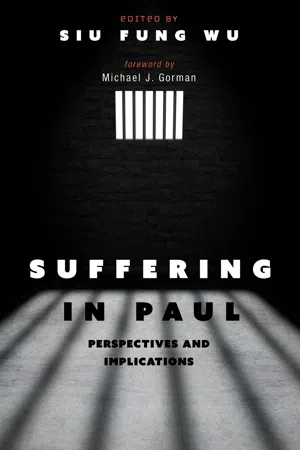![]()
1
Introduction
Siu Fung Wu
Suffering is an important theme in Paul’s letters and there are many implications for the church. Pauline scholars are very aware of this. For example, Scott Hafemann says, “Paul’s suffering is not an addendum to his preaching. Nor is it merely a consequence of it. Rather, it is constitutive of it.” When speaking of Paul’s view of power and weakness, Gordon Fee says that the “present suffering is a mark of discipleship, whose model is our crucified Lord.” And in his book, Suffering and Hope, J. Christiaan Beker says that the church is called to redemptive suffering.
The vocation of the church to participate in Christ’s suffering is well summarized by L. Ann Jervis in her superb book, At the Heart of the Gospel: Suffering in the Earliest Christian Message.
Given the fact that such insightful studies are already available, the purpose of this book is not to rehash what has been done or to present a comprehensive study on suffering in Paul. Rather, the primary goal of the project is to make fresh contributions to the topic. While monographs on suffering in Paul do appear from time to time, the relatively small number of major studies does not, in my view, do justice to such a significant theme in the Pauline corpus. It is hoped that the essays in this volume will arouse greater interest among scholars, and provide researchers and educators with a resource on the topic.
Apart from making a contribution to scholarship, the purpose of this book is also to explore the implications of Paul’s view of suffering for the global church today. Our social location and cultural backgrounds do influence how we understand suffering. It is, therefore, gratifying that our authors come from a diverse background. They are based in five countries across three continents. Eight authors have written on specific Pauline texts and themes by focusing on Romans, 2 Corinthians, and Philippians, and most of them concluded their essays with brief comments on the implications of their findings for the followers of Jesus. Three contributors responded to the eight articles from their own cultural and social contexts—as a North American, a South Asian, and an Asian-Australian.
It is not a common practice for editors to point out the shortcomings of their books. But I do need to comment on the range of authors in this volume. I regret that only two of the contributors are women. I spent six months looking for female Pauline scholars who might be interested in the topic. But often they were already committed to other projects and hence could not write for this book. I also regret that there are no contributors from outside Asia, Australia, and North America. There are no Indigenous authors either. These deficiencies are due to the small size of my network and hence the limited capacity to find more female contributors and scholars from different cultural backgrounds.
The essays are ordered according to their different focuses, themes, and approaches. Roy Ciampa, Xiaxia Xue, and David Starling discuss suffering in Paul by focusing on several selected texts and intertexts. Their studies on Romans and “the weapons of righteousness” in 2 Corinthians bring unique contributions to our subject. Sean Winter, Haley Goranson Jacob, and I pay special attention to the notion of participation in Christ and the relationship between suffering and glory. The analyses in these essays reveal the cross-shaped Christ-centered character of suffering and the paradoxical coexistence of suffering and glory. Kar Yong Lim and Sunny Chen provide further insights into suffering in Paul by employing their expertise in social identity theory and discourse analysis. According to their studies, suffering is key to Christian identity formation, and the thematic meaning of the terms θλῖψις and στενοχωρία emphasizes corporate solidarity and ecclesial relationships. Finally, Sanyu Iralu, Timothy Gombis, and I respond to the essays through our different cultural and social lenses. These responses serve to enrich our understanding of suffering by opening our eyes to each other’s perspectives. My chapter will also function as a conclusion for the book.
I am grateful for the participation of the contributors. Their insights have been a blessing to me personally. May this book be beneficial to all who read it.
Bibliography
Beker, J. Christiaan. Suffering and Ho...
